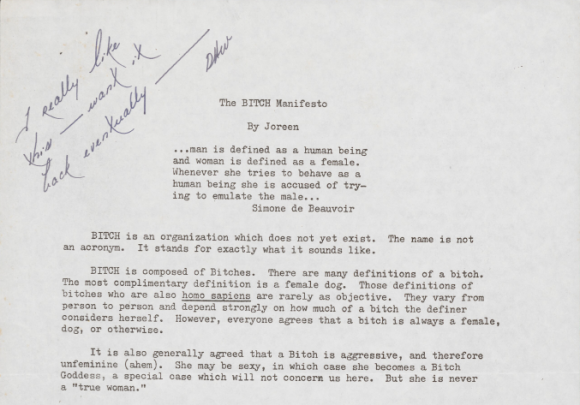I was introduced to the word bitch at a young age listening into my older sister’s conversation with my mom about the girls in her grade. “…and then she called me a bitch,” my sister exclaimed through her tears. Both my sister and mom stopped to look behind at me in the backseat of the car, only to find me staring right back at them. Yes, I heard the word – and I knew from the silence it was a word I shouldn’t have heard.
“What does that mean?” I asked them. More silence.
“Um,” my mom stumbled over her words, “a girl dog…like Penny.”
I thought of our red and white cavalier Penny, how her sweet demeanor was always adored by our family and fawned over by strangers. Why would Tae be sobbing over someone comparing her to a cute puppy? I never heard anyone call our dog a bitch before.
I squinted my eyes in suspicion as they continued their conversation, this time in more hushed voices.
I became used to the negative connotations behind the word as I grew older. I started using it myself, to describe girls I didn’t like, female teachers who gave me poor grades, even friends I was upset with. Bitch morphed into a casual term part of the vocabulary of myself and other girls around me. Bitch was an integral word used in gossip circles.
Who are Bitches, and what are they like? Why am I so drawn to use this word throughout my project, so drawn in fact, that I am including it in my title? What is the significance of this word to me?
Bitch derives from the Old English word bicce, meaning “female dog”. In the fifteenth century, the word was being used as a slur towards women, similarly to the usage of “slut.” In Jo Freeman’s Bitch Manifesto, she writes, “Men create a special category for [Bitch] in which she is accounted at least partially human, but not really a woman.”1 By using a term that describes domestic pets, women were degraded to the same level as a dog – an obedient pet who cannot speak for itself. In the 1900s, bitch had transformed, yet again, into a term used mainly by men to “describe bothersome and annoying women.”2 Since then, bitch has become somewhat universal in the English language to describe a woman – whether it be out of jealousy, fear, hatred, or, most recently, of endearment.
Jo Freeman, a feminist pioneer in the 70s, claims:
“the most prominent characteristic of all Bitches is that they rudely violate conceptions of proper sex role behavior…Their attitudes towards themselves and other people, their goal orientations, their personal style, their appearance and way of handling their bodies, all jar people and make them feel uneasy.”3
To call someone a bitch is to other her from yourself – she’s a bitch because she is at the top of her job and she must have a cold, distant personality; she’s a bitch because she wears revealing clothes and likes the attention from men, unlike a “girl’s girl”; she’s a bitch because she doesn’t like the attention from men, she rarely even smiles at them.
The reclamation of the word bitch began in the 70s, 80s, and 90s second-wave feminism movement, which opened the door to more loving ways of using the word. Yet, this reclamation was still rooted in the whiteness of second-wave feminism. How can this word be used for more than just white women?
I’m a bitch. I can be hot headed, cold, distant, mysterious, slutty, sleazy, a tease, loving, generous, funny, thoughtful. I am a lot of things, and so is a Bitch. Bitches are multifaceted people, of any gender, of any sexuality. You can be a bitch if you want, there are no specific qualifications. You can detest the word bitch and exclude it from your vocabulary. You can embrace it.
- Jo Freeman (Joreen), “The BITCH Manifesto,” Notes from the Second Year, (Shulamith Firestone and Anne Koedt, 1970).
- Cecilia Nguyen, “The History of the Word ‘Bitch’ and its Inherent Subordinating Nature,” The Revival Zine, August 27, 2020. https://therevivalzine.com/2020/08/27/the-history-of-the-word-bitch-and-its-inherent-subordinating-nature/.
- Joreen, “The BITCH Manifesto.”
